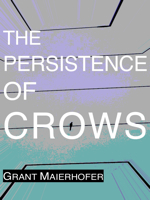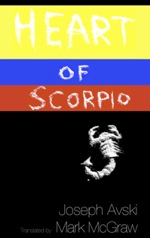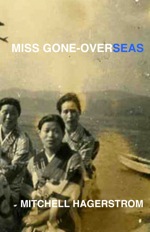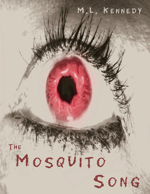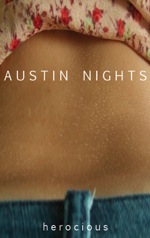by Michael Davidson
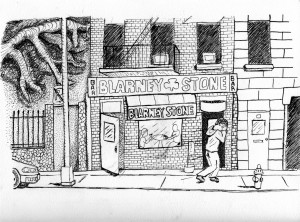
Illustration by Bridget
The women are talking in Spanish downstairs. They’re mopping the floors and dusting the counters with rags, making the air in this big house smell clean. Both have eyes the color of leaves capable of bearing fruit, both clean houses for a living, one house every day of the week, five houses total. And the money is on the table for them to take before they leave.
Sixty-five dollars cash: a day’s work.
“Don’t you get bored staying in this big house all day?” That question was left for me to answer, posed by one of the Spanish women, Elsie, as she mopped the parquet floor of the study, and I was reading Saul Bellow on the divan, nearing the end of Herzog. I closed the book and marked my place with my forefinger. Then I looked at her, into those eyes that had fruits growing out of them, and I smiled because I knew I was a sight to pity in my blue-hooded sweatshirt, lying horizontal when everyone else was out in the world working to make their living. I said, “No,” in my most convincing voice, but I knew my answer wasn’t good enough for her; she needed an explanation, a complete sentence, so I said, “No, because I like to read, and I have this book.” I showed her the black-and-white picture of Penn Station, the cover of my copy of Herzog. She looked at it and her eyes almost dropped some of their fruit when she asked, “Oh yes?” I nodded my head, my body recumbent, and she declared, “I don’t. I get bored if I stay inside all day.” This was her prerogative.
Elsie then left the study and mopped her way into the next room, ceilings towering above her. The other Spanish woman, someone I had never seen before, was in charge of the rag, ragging the counters until the granite sparkled. They conversed among themselves, rolling their tongues. I didn’t listen. I was on the last paragraph and I wanted to absorb the words. The inside of me was calm, or at least it had grown calmer with Moses E. Herzog finally finding serenity after so much trouble, and now he was lying down with me, stretching out, breathing long, and there was a woman also cleaning his house downstairs, Mrs. Tuttle, and he had something to say to her but he wasn’t going to say it just yet because “at this time he had no messages for anyone. Nothing. Not a single word.”
There: that was the end. Bellow – Herzog – had nothing more to share with me. I was fine with that.
I closed the book and stared at the high ceiling and felt like I had learned another truth in this world. Then a magic hand, invisible, sprinkled tickle-dust throughout my body: all over I felt tiny explosions similar to the tiny explosions I felt when I picked up my diploma in Chicago, when it was conferred upon me and I shook the president’s hand. Don Randel was his name, and I would’ve given him all my money right there on the stage, in front of the camera crowd, if I had any to begin with. When I sat back down in Harper Court, heart beating hard, I remembered thinking in that sea of black gowns and mortarboards that this was what I had paid for; this was why I had come to The University of Chicago. Not to learn and make friends, not to live in the cold winters and muggy summers; no, this – these tiny explosions – was the reason behind everything.
In the after-party I drank the free champagne with the diploma in my hand and I looked for my father, my friends, my girlfriend. One by one I found them and we took every permutation of picture possible. First me by myself, then me with my father, then me with my father’s friend, Dan, then me with my uncle and his wife; my uncle and my father, then me standing next to my friend, Bill. In every picture I had the champagne in my hands, along with my diploma protected in a maroon case. Everyone was so proud of me; I had accomplished a great feat and now everyone couldn’t wait to see what I was going to do with my life, the victories I’d play out, the history I’d write.
I packed up and left two days from then. My girlfriend arranged my clothes so they’d fit in the two bags I owned. She was on her knees, kneeling on my dusty barn-red floor, and folding pants and shirts, some of which I didn’t even like. Then she zipped the bags up and helped me carry them out to the Mercedes, where my father stood with the trunk and backdoors open. When I was ready for departure I wrote a note to Carl and gave a big-man-hug to Bill only because my girlfriend didn’t want to see us say goodbye so curtly, she wouldn’t stand for it after the friendship Bill and I had developed, lived through, earned.
Then we left: the front door to 5602 apartment #1 closed for the first time without being locked because I had to leave the key on the inside; it had to be returned to the landlord. My girlfriend and I sat in the front seat of the Mercedes together; the backseat was loaded. I touched her body without using my hands: thigh against thigh, hairless, toned; shoulder to shoulder, thin, impossibly thin but healthy enough to play lacrosse, be the team captain; ass cheek against ass cheek, the part of her that crazed me most. We didn’t talk much. My father was driving.
Dropped her off at Woodlawn, at her apartment on the second floor, and said goodbye on the street, next to the red fire hydrant. We kissed. Hugged. Ten months later we were finished. My girlfriend somebody else’s, and when I visited her in NY City I ran out of a Brooklyn bar, away from her – I didn’t want her to see me cry – and I walked around the block with my face hard in the Fall air, hoping to God that she’d follow me, chase down the man she had once loved, the boy she could now live without. When I turned around the first time, there was no one. I panicked. When I turned around the second she was there. I stopped and waited for her. I was still in love. My face wrinkled as I cried and spewed the rotten tenderness inside me, my spittle covering the sidewalk, mixing with my tears, and my words trying hard to get her to smile like she used to. I wanted her back; I would’ve done just about anything to hear her say, “I still love you, too,” but I knew I had to move on, and I never said I still love you to begin with.
Back in the past, by the red fire hydrant, we still kissed. Still hugged. We reassured one another that we’d see each other soon, drive to San Francisco and start our lives together, living as a couple, making love – naked, warm – after interviewing for jobs. Back in the past it was only goodbye for now. Then my father and I were alone in the Mercedes, listening to Wilco sing, driving to 55th Street, and from there to Miami, Florida to see my sister graduate from High School. On the way there we got a flat tire outside Macon, Georgia, but that was about all.
I’ll skip everything between then and now. The stuff in the middle is foolish, stained with bum-days in San Diego, riding Bill’s bike to work, to drive a beat-up truck around and pick up golf balls on a poorly run driving range, getting paid minimum, my lifestyle depending on the tip jar. Like I said, foolish. So we’ll jump to the now: me lying on the divan, resembling Herzog lying on his Recamier couch, whatever kind of couch that is, and Elsie mopping her way into the next room. The tiny explosions have stopped, the tickle-dust expired: nothing lasts for too long; no, nothing ever does, and this might be the only hope I have.




